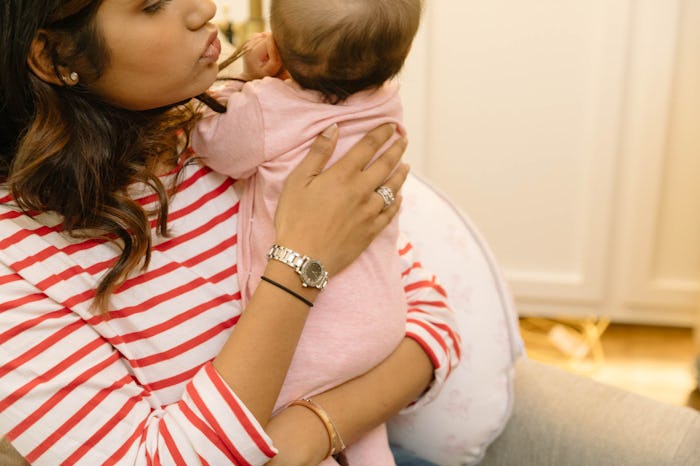Life
5 Reasons Breastfed Babies Burp So Much, According To Science
As helpful as it would be, babies don't come with their own "how-to" manual. Parents have the endlessly exciting (read: exhausting) job of decoding their baby's each and every move, hiccup, and dirty diaper to ensure their little one is happy, healthy, and nourished. One of the common concerns of new mothers is that their baby is uncomfortable because of how often they burp. Burping is commonly thought of as a sign of stomach pain, so their worry isn't without warrant. However, learning a few of the most common reasons breastfed babies burp so much is essential for all new moms because burping isn't usually a bad sign.
According to Parents, babies burp a lot whether they're breastfed or bottle-fed — it's just their digestive system doing its job. Typically though, breastfed babies burp less often than bottle-fed babies. However, there are certain factors that may cause your breastfed baby to burp more than you think they should. To make things even more confusing (and that imaginary manual even more enticing), baby burps can be caused by a variety of factors, some having to do with diet, others with the way they're breastfeeding. Whatever the cause of your baby's burps, knowing why it's happening can help you determine whether it's a "normal" burp or an "upset" burp so you can both be as comfortable as possible.
1They Breastfeed While Fussing & Swallow Air
According to the aforementioned Parents article, bottle-fed babies notoriously gulp down more air while they're feeding, which causes air bubbles in their tummy, causing them to burp. Air bubbles are the result of too-fast feeding or not burping baby often enough and generally aren't as much of a concern for breastfed babes.
However, the article also noted that breastfed babies can gulp down air as well if they're especially hungry, or squirmy while eating. Fussiness while breastfeeding is usually due to discomfort of some kind or an issue with milk flow, according to Belly Belly, and burping or excess spitting up can result if the issue isn't resolved.
2You Don't Burp Them When You Switch Sides
The website for Dr. Sears noted that although breastfed babies don't need to be burped as frequently as bottle-fed babies, the occasional burp as you switch sides can reduce your baby's discomfort, especially if they're a fast feeder. There are many ways to effectively burp your baby, but as long as they get a burp or two out with each feeding, you can assume that their tummy is content and air bubble free.
3Their Digestive System Is Doing Its Job
As the aforementioned Parents piece noted, burping (even more than you might think is "normal") is simply a sign of your baby's digestive system doing its job. If you've eaten gas-inducing foods like carbohydrates, beans, broccoli, or soda, you might notice your baby burping more than usual. But as long as they're burping well and aren't showing signs of constipation or stomach pain, you shouldn't assume that they're uncomfortable.
4They May Have A Food Allergy
A less common scenario, but one that's worth considering if the burping doesn't subside or only occurs when baby eats certain foods, is that your baby may have a food allergy or sensitivity. According to Breastfeeding Basics, true food allergies in babies are rare, and the most common sensitivity is to dairy (around 2 to 7 percent of babies). However, if you can't find the culprit to your baby's burping, upset stomach, or reflux, beginning the "process of elimination" in your own diet may be helpful.
5You May Have A Strong Let Down Reflex
Much in the same way that a bottle-fed baby swallows air from a bottle, some babies can get air bubbles in their tummy when their mom has an oversupply of breast milk or an especially strong let down reflex. According to Mama Natural, burping can be a sign of overactive letdown when it occurs often with other symptoms like spit up, choking or coughing, or gulping while breastfeeding.
